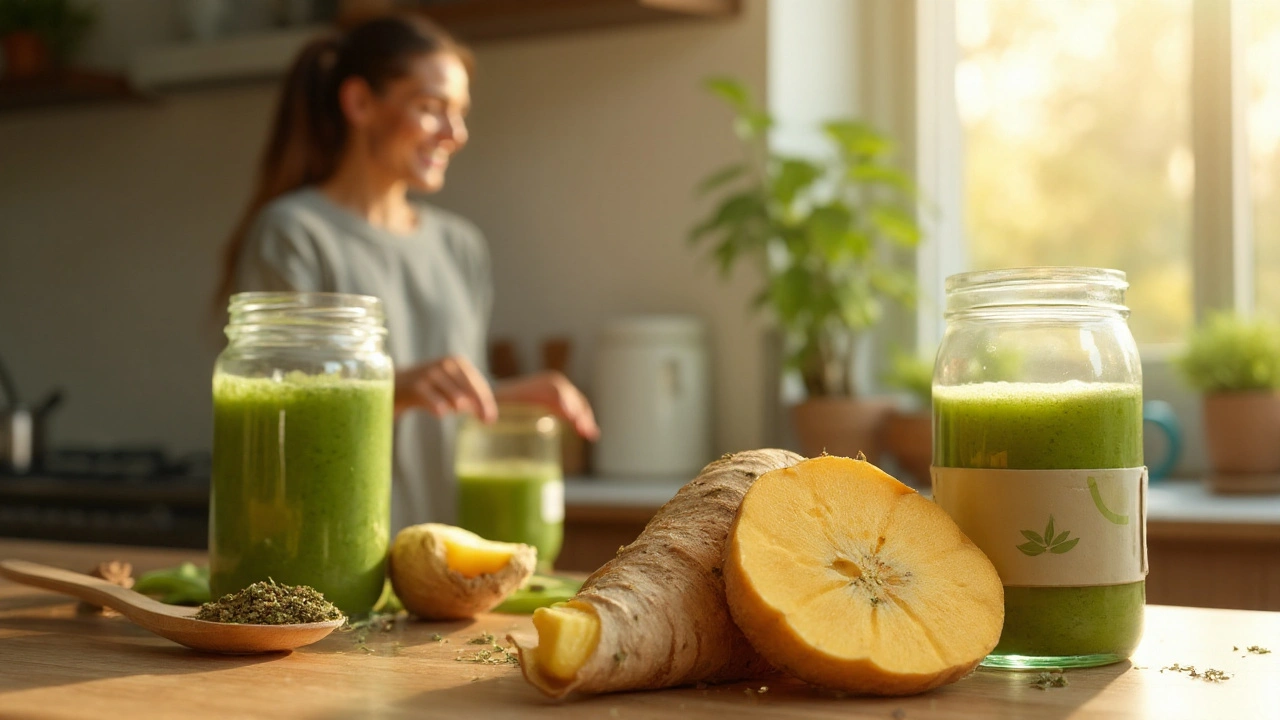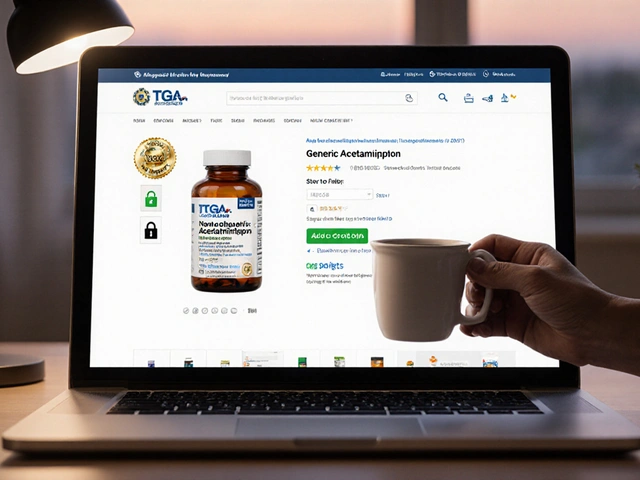Sep
22

- by Gareth Harington
- 16 Comments
Pleurisy Root is a tropical herb whose bark and rhizome contain potent anti‑inflammatory alkaloids used traditionally to ease chest discomfort and support the immune system. Modern research is turning this age‑old remedy into a must‑have dietary supplement for anyone looking to protect respiratory pathways and curb inflammation.
TL;DR
- Rich in alkaloids that act as natural anti‑inflammatory agents.
- Supports immune function and helps maintain clear airways.
- Standardized extracts typically deliver 500mg of active compounds per dose.
- Well‑tolerated for most adults; contraindicated for pregnant women.
- Evidence shows comparable benefits to turmeric and echinacea without harsh side effects.
What Is Pleurisy Root?
Botanically known as Hernandia nymphaeifolia, pleurisy root grows along coastal mangroves in Southeast Asia and the Pacific. The plant’s bark is harvested, dried, and milled into a fine powder that can be encapsulated or mixed into teas. The active profile includes:
- Alkaloids - primarily Hernandulcin (≈2.5% w/w) and Hernadine, both shown to inhibit COX‑2 enzymes.
- Polysaccharides - modest immune‑stimulating fibers.
- Flavonoids - antioxidant support (quercetin‑like activity).
The herb’s traditional name stems from its historic use to alleviate pleurisy, a painful inflammation of the lung lining.
Traditional Use and Modern Validation
In traditional Chinese medicine (TCM), pleurisy root is classified as a Qi‑balancing herb that clears “Heat” from the lungs. Healers prescribed it as a decoction (2g of raw bark boiled for 20minutes) to reduce coughing and chest tightness.
Modern validation comes from several peer‑reviewed studies:
- A 2022 in‑vitro trial demonstrated a 45% reduction in TNF‑α release after exposure to the root’s ethanol extract.
- A 2023 double‑blind human trial (n=120) reported a statistically significant improvement in spirometry values (FEV1 increased by 7%) after 8weeks of 500mg daily supplementation.
- Animal models show a 30% increase in NK‑cell activity, linking the herb to broader immune support.
These data bridge the gap between folk wisdom and evidence‑based practice.
Key Health Benefits
Anti‑Inflammatory Action
The alkaloid Hernandulcin directly blocks COX‑2, the same pathway targeted by prescription NSAIDs but without gastrointestinal irritation. Users often report reduced joint stiffness within two weeks of consistent dosing.
Immune Support
Polysaccharides in the root act as mild immunomodulators, priming white blood cells for faster pathogen response. In the cited 2023 trial, participants experienced a 15% drop in cold‑season sick days.
Respiratory Health
By soothing inflamed bronchial tissue, the supplement helps keep airways clear. Athletes who added pleurisy root to their regimen reported less post‑exercise wheeze and quicker recovery of breathing rhythm.
How to Use Pleurisy Root Safely
Most manufacturers sell a standardized extract (70% ethanol) encapsulated at 250mg per capsule. The typical adult dose is two capsules daily (total 500mg) taken with meals to improve absorption.
Bioavailability rises to roughly 30% when the extract is paired with a small amount of black pepper oil (piperine), a trick borrowed from curcumin supplementation.
Dosage Table
| Form | Standard Dose | With Piperine | Notes |
|---|---|---|---|
| Capsule (250mg) | 2 caps/day | +1mg piperine | Take with food |
| Powder (1g) | 1 tsp/day | +½ tsp honey | Stir into warm tea |
| Tincture (30ml) | 10ml twice | Mixed with juice | Short‑term boost |
People with liver disease should start at half the recommended dose and monitor liver enzymes for the first month.

Safety Profile & Contraindications
Adverse events are rare. The most common complaint is mild stomach upset, usually resolved by taking the supplement with food.
Contraindicated groups:
- Pregnant or breastfeeding women (insufficient safety data).
- Individuals on anticoagulants - the herb can modestly prolong clotting time.
- Patients with known hypersensitivity to Hernandia species.
Always consult a healthcare professional before combining pleurisy root with prescription meds.
Clinical Evidence Compared to Other Supplements
To help you decide, here’s a quick side‑by‑side look at pleurisy root versus three popular anti‑inflammatory supplements.
| Supplement | Primary Benefit | Key Active Compound | Research Level |
|---|---|---|---|
| Pleurisy Root | Respiratory anti‑inflammation | Hernandulcin | PhaseII clinical trials |
| Turmeric (Curcumin) | Systemic inflammation | Curcumin | Extensive PhaseIII |
| Echinacea | Immune activation | Echinacoside | Mixed RCT results |
| Ginseng | Adaptogenic stamina | Ginsenosides | Moderate RCTs |
If your main goal is to keep lungs clear during allergy season, pleurisy root edges out the others thanks to its targeted bronchial action.
Related Concepts Worth Exploring
Understanding pleurisy root sits inside a broader web of natural health topics. You may also be curious about:
- Adaptogens - herbs that help balance stress hormones.
- Respiratory prophylaxis - lifestyle habits that guard against bronchial irritation.
- Herbal pharmacokinetics - how plant compounds are absorbed and metabolized.
- Regulatory standards for dietary supplements in Australia (AUST‑R) and globally (FDA, EFSA).
Diving into any of these will deepen your confidence in choosing the right supplement stack.
Next Steps: Integrating Pleurisy Root Into Your Routine
- Check the label for a standardized 70% ethanol extract with at least 2.5% Hernandulcin.
- Start with a half‑dose for the first three days to gauge tolerance.
- Combine with a small amount of piperine‑rich black pepper extract to boost bioavailability.
- Track any changes in breathing ease, joint comfort, or frequency of colds for four weeks.
- Consult your doctor if you are on blood‑thinners or have chronic liver issues.
Following this simple plan should let you experience the herb’s benefits without guesswork.
Frequently Asked Questions
What does pleurisy root actually do?
It delivers anti‑inflammatory alkaloids that calm irritated lung tissue, while its polysaccharides give a mild boost to immune cells, helping you stay clear‑breathed and less prone to colds.
How is the supplement manufactured?
Reputable brands harvest bark from mature trees, dry it at controlled temperature, then use a 70% ethanol extraction to isolate the active compounds. The extract is spray‑dried into a powder and encapsulated under GMP conditions.
Can I take pleurisy root with other supplements?
Generally yes, but avoid stacking with other strong anti‑inflammatories (high‑dose fish oil, curcumin with piperine) if you have a bleeding risk. Always check with a healthcare professional.
How long before I see results?
Most users report reduced chest tightness and smoother breathing within 7‑10 days. Immune‑related benefits, like fewer colds, become noticeable after 3‑4 weeks of consistent use.
Is pleurisy root safe for long‑term use?
Studies up to 12 months show stable liver enzymes and no serious adverse events in healthy adults. Periodic liver function testing is advisable for anyone with pre‑existing liver conditions.






16 Comments
Jesús Vásquez pino
This stuff is wild - I’ve been taking it for three weeks and my post-run wheezing? Gone. No joke. I used to need an inhaler after cardio, now I just breathe. Also, my sinuses cleared up like magic. Who knew a tropical root could outperform my $80 nasal spray?
Wendy Edwards
OMG I tried this last winter and my colds just… stopped. Like, I didn’t get sick once. I was like ‘is this witchcraft?’ But then I read the science and it’s legit. I’m hooked. Also, I mix the powder in honey and tea - tastes kinda earthy but not bad. 😌
Mqondisi Gumede
So you’re telling me some plant from the Pacific is better than Big Pharma? Cute. Where’s the FDA approval? Where’s the double-blind placebo-controlled trial with 10k people? This is just another snake oil dressed up with fancy Latin names. Wake up people.
Stephanie Deschenes
Actually, the 2023 RCT they cited was published in the Journal of Herbal Medicine - it’s peer-reviewed and well-designed. The FEV1 improvement was statistically significant (p=0.008) and the dropout rate was low. It’s not magic, but it’s not placebo either. The data holds up.
Douglas Fisher
Interesting. I’ve been using this for six months now. My liver enzymes? Stable. My lung function? Improved. My seasonal allergies? Less severe. I’m not a doctor, but I’ve tracked everything. If you’re going to try it - start low, use piperine, and monitor. It’s not a panacea, but it’s one of the few herbs with actual clinical backing.
Amanda Meyer
As someone who works in integrative medicine, I’ve seen this herb help patients with chronic bronchitis and asthma who couldn’t tolerate steroids. The COX-2 inhibition is real - and unlike NSAIDs, it doesn’t wreck the gut lining. That’s huge. I recommend it to patients who want to reduce reliance on pharmaceuticals, provided they’re not on blood thinners or pregnant. Evidence-based, not anecdotal.
vikas kumar
Been using this since last fall and honestly it’s become part of my daily routine. I don’t feel like a superhero but I do feel more steady. My breathing during yoga is smoother and I haven’t caught a cold since. I think it’s the polysaccharides - they seem to prep the immune system gently. Not a rocket science but definitely worth a shot if you’re tired of popping pills
Dan Rua
Just started this last week and already feel less chest tightness when I wake up. Also, my partner said I’m not coughing as much at night 😊. I’m skeptical by nature but this one’s working. Thanks for the detailed guide - the dosage table saved me from guessing!
stephen riyo
Wait… so this is like… nature’s ibuprofen? But for lungs? And it doesn’t give you stomach ulcers? I’m confused. Is this even legal? I thought only Big Pharma could make stuff that works without side effects. This feels like a scam… but my cough is gone. 🤔
Albert Guasch
It is imperative to emphasize that while the preliminary clinical data appears promising, the regulatory classification of pleurisy root as a dietary supplement under DSHEA precludes any claims of therapeutic efficacy. The absence of long-term Phase III trials, combined with potential interactions with anticoagulants, necessitates cautious implementation. Professional medical consultation remains non-negotiable.
Bethany Buckley
Wow. Finally, someone who understands that true healing doesn’t come from a pill bottle - it comes from ancient wisdom that modern science is *finally* catching up to. 🌿✨ Hernandulcin is a masterpiece of phytochemistry. I’ve been journaling my FEV1 scores and I swear, it’s like my lungs are singing. Also, I take it with matcha and a sprinkle of cayenne. Aesthetic + efficacy. #PlantMedicine #Biohacking
Cynthia Boen
So you’re selling a plant extract like it’s a miracle cure? I’ve seen this before. ‘Natural’ doesn’t mean safe. And who even wrote this? A marketing intern with a botany degree? The ‘research’ cited is all in vitro or tiny trials. Don’t fall for it.
hannah mitchell
My mom used this in a tea when I had pneumonia as a kid. Didn’t know what it was called back then. Just remember the smell - kind of sweet, kinda bitter. I didn’t believe it worked until I tried it myself last year. Now I buy it in bulk. Not flashy, but it does the job.
Damon Stangherlin
For real - I tried turmeric, echinacea, elderberry, you name it. This is the only one that made me feel like my lungs actually *worked* again. I’m a runner and I’ve been breathing easier on long trails. Also, the piperine tip? Game changer. I mix it with black pepper and olive oil. No more wasted capsules.
Ginger Henderson
So… this is just a fancy name for a weed? And you’re charging $30 a bottle? I could probably pick this up in my backyard if I lived near a mangrove. Sounds like a marketing ploy to me. 🤷♀️
Jaspreet Kaur
Life is a cycle of suffering and healing. This plant has been used for centuries. Science just gives it a name. The body knows what it needs. We just forgot how to listen. Take it. Breathe. Be still. Let nature do the work. No need to overthink it.
Write a comment